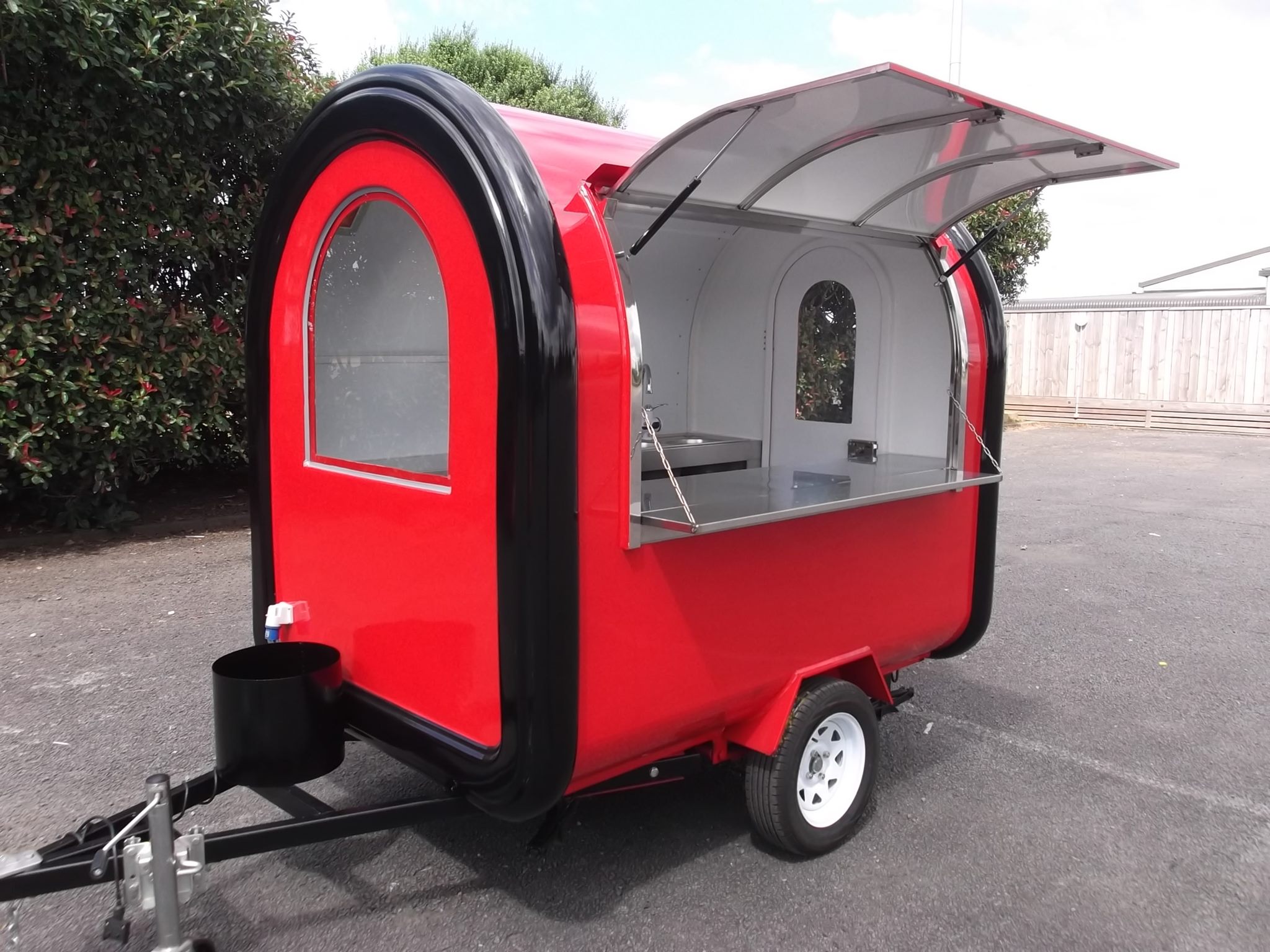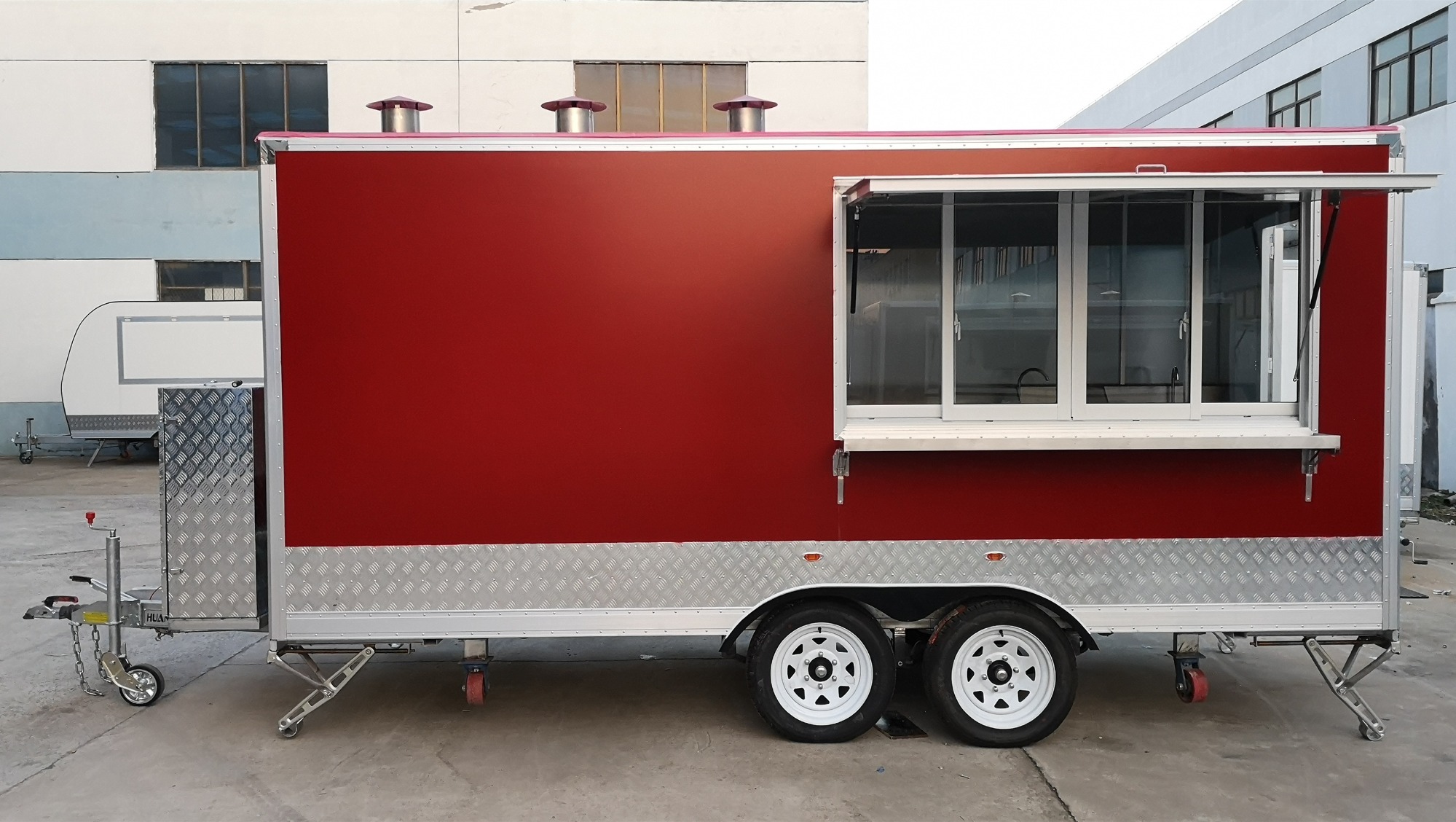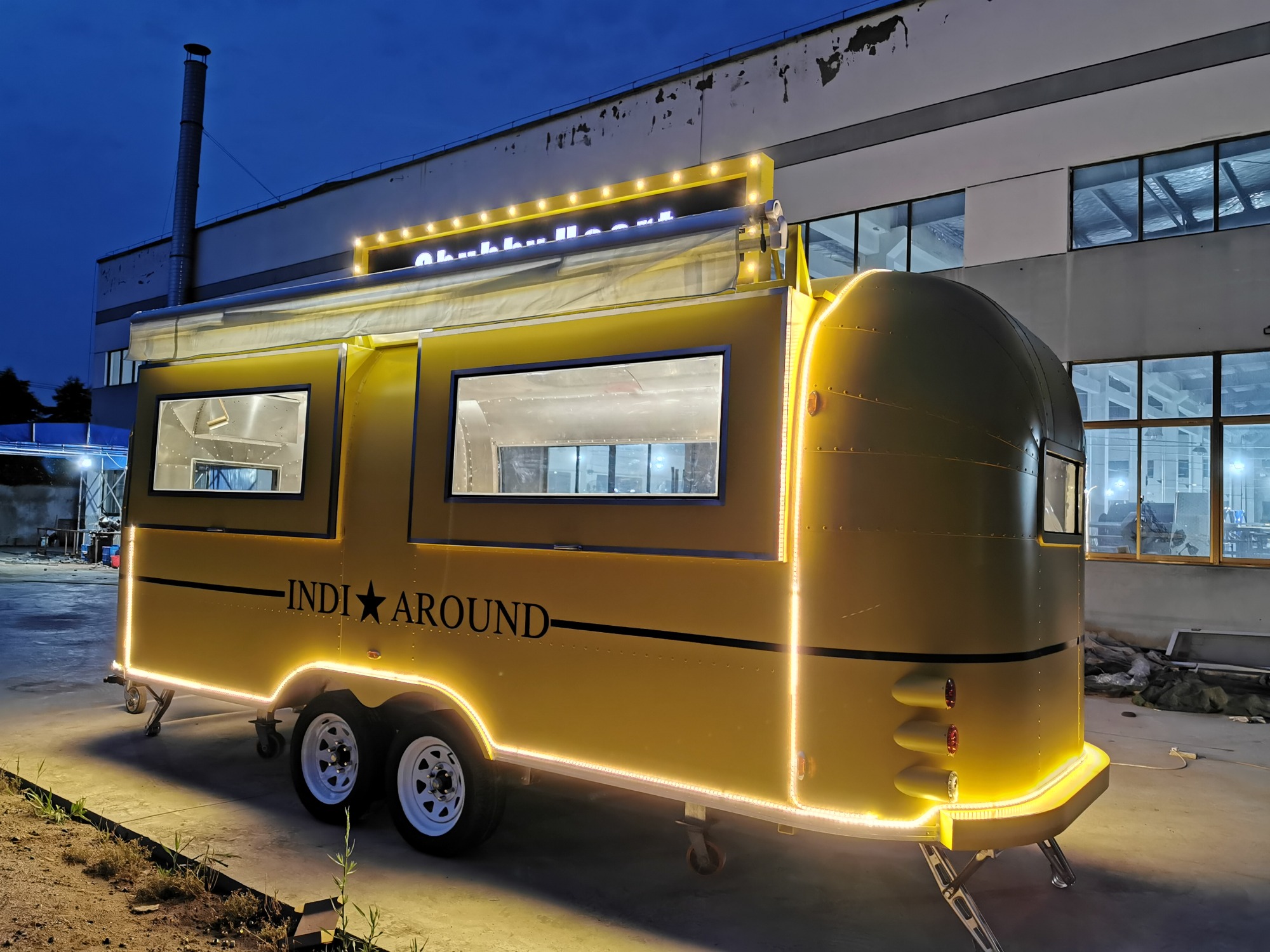Food trailers have emerged as a popular and profitable business venture, offering entrepreneurs the opportunity to share their culinary creations with the world. From gourmet burgers to artisanal tacos, food trailers cater to a wide range of tastes and budgets, making them a versatile and rewarding business model.
In this comprehensive guide, we will delve into the intricacies of starting and running a successful food trailer business. From design and equipment to menu development and marketing, we will cover every aspect to help you navigate the challenges and maximize the potential of this exciting industry.
Food Trailer Definition
A food trailer, also known as a mobile kitchen or catering trailer, is a vehicle equipped with a kitchen that allows food preparation and service on the go. These trailers offer a convenient and cost-effective way for entrepreneurs to start or expand their food businesses.Food
trailers come in various sizes and configurations, ranging from small, single-purpose units to larger, fully equipped kitchens. They can be customized to suit specific food concepts, offering a wide variety of cuisines, from street food to gourmet meals.
Food Trailer Design

The design of your food trailer is crucial for its success. It should be visually appealing, efficient, and functional to attract customers and ensure smooth operations.
Layout and Equipment
- Plan a layout that maximizes space and workflow, ensuring easy movement for staff and customers.
- Select equipment that is appropriate for your menu and volume, ensuring efficiency and food safety.
Exterior Design
- Create an eye-catching exterior design that reflects your brand and attracts attention.
- Use high-quality materials and graphics that can withstand the elements and maintain their appearance.
Ventilation and Safety
- Install proper ventilation systems to remove cooking odors and maintain a comfortable environment.
- Adhere to all safety regulations and ensure proper electrical, gas, and plumbing systems.
Food Trailer Equipment
Equipping a food trailer is crucial for efficient operations. The specific equipment required varies depending on the type of cuisine served and the menu items offered. However, there are several essential pieces of equipment that every food trailer should possess.
Cooking Equipment
The type of cooking equipment needed will depend on the menu. Some common options include:
- Griddle: For cooking burgers, sandwiches, and other flat-top items.
- Fryer: For preparing fried foods such as chicken, fries, and onion rings.
- Oven: For baking pizzas, pastries, and other baked goods.
- Stovetop: For boiling, simmering, and sautéing.
Refrigeration Equipment
Refrigeration is essential for storing perishable ingredients, such as meat, produce, and dairy products. Common refrigeration equipment includes:
- Refrigerator: For storing cold items at temperatures above freezing.
- Freezer: For storing frozen items.
- Ice maker: For producing ice for drinks and other purposes.
Other Essential Equipment
In addition to cooking and refrigeration equipment, other essential items for a food trailer include:
- Work surfaces: For food preparation and storage.
- Sink: For washing hands, dishes, and utensils.
- Storage containers: For organizing and storing ingredients, supplies, and equipment.
- Serving utensils: For serving food to customers.
- Safety equipment: Such as a fire extinguisher and first-aid kit.
Food Trailer Menu
Developing a food trailer menu requires careful consideration of several factors. Understanding your target audience, local competition, and food costs is crucial. It’s essential to offer a variety of dishes that appeal to different tastes while ensuring profitability.
Menu Design
- Keep it concise:Limit your menu to a few signature dishes and daily specials to avoid overwhelming customers.
- Highlight popular items:Use larger font or eye-catching graphics to draw attention to your most profitable or in-demand dishes.
- Use descriptive language:Craft mouthwatering descriptions that evoke the flavors and ingredients of your dishes.
- Consider dietary restrictions:Offer options that cater to specific dietary needs, such as gluten-free, vegan, or vegetarian.
Pricing Strategy, Food trailer
- Research market prices:Analyze competitor menus and industry benchmarks to set competitive prices.
- Calculate food costs:Accurately calculate ingredient costs to ensure profitability.
- Consider value-based pricing:Set prices based on the perceived value of your dishes rather than solely on ingredient costs.
- Offer value combos:Bundle items together to offer discounts and encourage larger orders.
Food Trailer Marketing
Marketing is crucial for the success of any food trailer. Effective strategies can help you attract customers, build a loyal following, and increase sales.
Here are some effective marketing strategies for food trailers:
Online Marketing
- Social Media:Create a strong social media presence on platforms where your target audience is active. Share engaging content, run contests, and use social media advertising to reach a wider audience.
- Website:Have a website that provides information about your menu, location, and contact details. Make sure your website is mobile-friendly and easy to navigate.
- Online Food Delivery:Partner with online food delivery services to expand your reach and make it easier for customers to order your food.
Offline Marketing
- Local Events:Participate in local events, such as food festivals and farmers’ markets, to introduce your food trailer to new customers.
- Flyers and Posters:Distribute flyers and posters in high-traffic areas to promote your food trailer and its offerings.
- Signage:Have eye-catching signage on your food trailer that clearly displays your brand and menu.
- Word-of-Mouth Marketing:Encourage satisfied customers to spread the word about your food trailer through positive reviews and referrals.
Innovative Marketing Ideas
- Pop-Up Events:Host pop-up events in different locations to create a sense of exclusivity and generate excitement around your food trailer.
- Collaborations:Partner with other local businesses, such as breweries or coffee shops, to offer joint promotions or cross-promote each other’s products.
- Influencer Marketing:Reach out to local food bloggers or influencers to review your food trailer and share their experiences with their followers.
- Gamification:Create a loyalty program or mobile app that rewards customers for repeat visits and encourages them to engage with your brand.
Food Trailer Operations

The day-to-day operations of a food trailer involve various tasks to ensure smooth functioning. These include preparation, setup, serving, and closing down procedures.
To set up a food trailer, start by arriving at the designated location and parking the trailer securely. Connect utilities such as electricity, water, and gas. Unload and arrange equipment, supplies, and ingredients. Ensure food safety by maintaining proper temperatures and following hygiene protocols.
Opening the Trailer
Before opening, conduct a thorough inspection of the trailer and equipment. Check food supplies, restock as needed, and prepare any necessary sauces or condiments. Turn on appliances and allow them to reach operating temperatures. Display menu items clearly and prepare for customers.
Serving Customers
Greet customers warmly and take orders accurately. Prepare food items efficiently while maintaining high quality standards. Handle payments promptly and provide excellent customer service. Maintain cleanliness and organization throughout the serving period.
Closing Down the Trailer
After serving customers, clean and sanitize all equipment and surfaces. Store leftover food and ingredients properly. Disconnect utilities and secure the trailer for transport. Conduct a final inspection to ensure everything is in order and the trailer is ready for the next day’s operations.
Food Trailer Regulations
Food trailers, like any other food establishment, must adhere to specific regulations and legal requirements to ensure the safety and quality of the food they serve. These regulations vary across different jurisdictions, but generally cover aspects such as licensing, health inspections, and food safety practices.
Licensing and Permits
Obtaining a license or permit is typically the first step towards operating a food trailer. The requirements for obtaining a license may vary depending on the jurisdiction, but typically involve submitting an application, providing proof of insurance, and undergoing a health inspection.
Health Inspections
Food trailers are subject to regular health inspections to ensure they meet the required standards of sanitation and food handling. These inspections may be conducted by local health departments or other regulatory agencies and cover areas such as food storage, preparation, and equipment maintenance.
Food Safety Practices
Food trailers must adhere to strict food safety practices to prevent foodborne illnesses. These practices include proper food storage, cooking temperatures, and employee hygiene. Food handlers must be trained in food safety and follow established protocols to ensure the safety of the food they serve.
Food Trailer Trends

The food trailer industry is constantly evolving, with new trends emerging all the time. These trends are driven by a number of factors, including changing consumer preferences, advances in technology, and the growing popularity of street food.One of the most notable trends in the food trailer industry is the increasing focus on innovation.
Food trailer operators are constantly experimenting with new concepts and technologies to create unique and memorable dining experiences. For example, some food trailers are now using virtual reality headsets to allow customers to experience different cuisines from around the world.
Others are using 3D printing to create custom-made food items.Another trend in the food trailer industry is the growing popularity of healthy and sustainable food options. Consumers are increasingly looking for food that is both good for them and good for the planet.
Food trailer operators are responding to this demand by offering a wider variety of healthy and sustainable menu items. For example, many food trailers now offer vegan and gluten-free options.The food trailer industry is also being shaped by the growing popularity of social media.
Food trailer operators are using social media to connect with customers, promote their businesses, and generate buzz. For example, many food trailers now have dedicated Instagram accounts where they post photos of their food and updates on their location.These are just a few of the trends that are shaping the future of the food trailer industry.
As the industry continues to grow and evolve, it is likely that we will see even more innovative and exciting concepts emerge.
Food Trailer Design
The design of a food trailer can have a big impact on its success. A well-designed food trailer will be eye-catching, functional, and easy to operate.There are a number of factors to consider when designing a food trailer. These include:*
-*The type of food you will be serving
The type of food you will be serving will determine the layout of your trailer and the equipment you need. For example, if you are serving fried food, you will need a fryer and a ventilation system.
-
-*The size of your trailer
The size of your trailer will determine how many customers you can serve at one time. You will also need to consider the size of your equipment and the amount of storage space you need.
-*The location of your trailer
The location of your trailer will determine the type of customers you will attract. For example, if you are located in a busy downtown area, you will need to have a trailer that is easy to find and park.
Once you have considered these factors, you can start to design your food trailer. It is important to work with a qualified designer to create a trailer that meets your specific needs.
Food Trailer Equipment
The equipment you use in your food trailer will have a big impact on the quality of your food and the efficiency of your operation. It is important to choose equipment that is durable, reliable, and easy to use.The following is a list of essential equipment for a food trailer:*
-*A grill
A grill is used to cook food over an open flame. It is a versatile piece of equipment that can be used to cook a variety of foods, including burgers, hot dogs, and steaks.
-
-*A fryer
A fryer is used to cook food in hot oil. It is a great way to cook fried chicken, french fries, and other fried foods.
-*A refrigerator
A refrigerator is used to store food and keep it cold. It is important to have a refrigerator that is large enough to store all of the food you will need for a day’s operation.
-*A freezer
A freezer is used to store food for long periods of time. It is a good idea to have a freezer to store frozen foods, such as meat, poultry, and seafood.
-*A sink
A sink is used to wash dishes and hands. It is important to have a sink that is large enough to accommodate all of the dishes you will need to wash.
In addition to these essential pieces of equipment, you may also want to consider purchasing other items, such as a food warmer, a display case, and a point-of-sale system.
Food Trailer Case Studies
The food trailer industry is booming, with new businesses popping up all over the country. But what makes a food trailer successful? What are the factors that contribute to their success?
To answer these questions, we’ve compiled a list of case studies of successful food trailer businesses. We’ll analyze their business models, marketing strategies, and operational practices to identify the key ingredients for success.
The Grilled Cheese Truck
The Grilled Cheese Truck is a food trailer that specializes in gourmet grilled cheese sandwiches. The truck was founded in 2009 by two friends who were passionate about food and wanted to create a unique dining experience. The Grilled Cheese Truck has since become one of the most popular food trailers in Los Angeles, with lines often stretching down the block.
The Grilled Cheese Truck’s success can be attributed to several factors:
- Unique menu:The Grilled Cheese Truck’s menu features a variety of grilled cheese sandwiches, including classic favorites like the American and the Cheddar Melt, as well as more creative options like the Brie and Fig and the Lobster Grilled Cheese.
- High-quality ingredients:The Grilled Cheese Truck uses only the finest ingredients, including artisanal bread, gourmet cheese, and fresh produce.
- Excellent customer service:The Grilled Cheese Truck’s staff is friendly and attentive, and they always go the extra mile to make sure that customers have a great experience.
Food Trailer Industry Statistics
The food trailer industry has experienced significant growth in recent years, driven by the increasing popularity of street food and the convenience and affordability of mobile dining options.The global food trailer market was valued at USD 2.5 billion in 2022 and is projected to reach USD 4.5 billion by 2027, exhibiting a CAGR of 9.5% during the forecast period.
This growth is attributed to the growing demand for street food, the increasing popularity of food festivals and events, and the rise of food trucks as a viable alternative to traditional brick-and-mortar restaurants.In the United States, the food trailer industry is estimated to generate over USD 2 billion in revenue annually.
The industry is highly fragmented, with a large number of small, independent operators. However, there are also a number of large, national chains that operate food trailers, such as Taco Bell, Chick-fil-A, and Subway.The food trailer industry is expected to continue to grow in the coming years.
The increasing popularity of street food, the growing demand for convenience, and the affordability of food trailers are all factors that will contribute to this growth.
Common Queries
What are the legal requirements for operating a food trailer?
The legal requirements for operating a food trailer vary depending on your location. It’s essential to research and obtain the necessary licenses, permits, and health inspections to ensure compliance with local regulations.
How much does it cost to start a food trailer business?
The cost of starting a food trailer business can vary significantly depending on factors such as the size and type of trailer, equipment, and location. It’s important to create a detailed budget that includes all startup and ongoing expenses.
What are the best marketing strategies for food trailers?
Effective marketing strategies for food trailers include social media marketing, online advertising, local partnerships, and community events. Leveraging social media platforms to showcase your menu, engage with customers, and run targeted ads can be highly effective.
